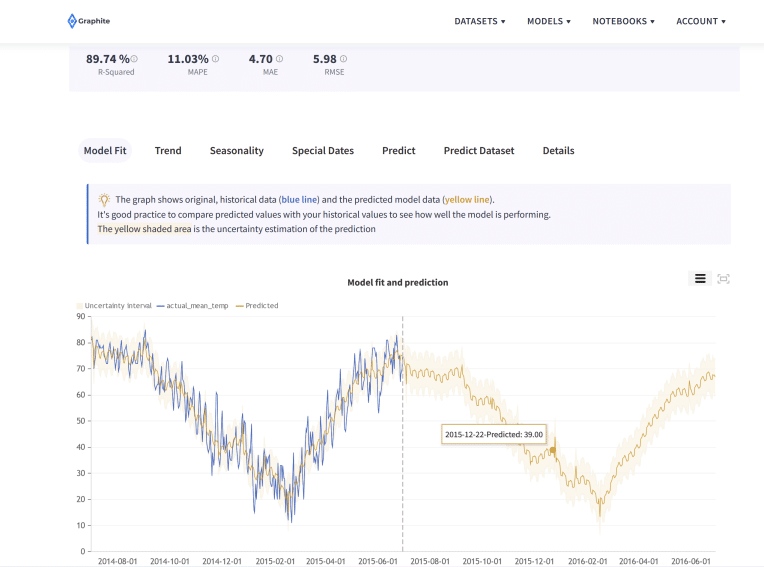What Is Regression in Machine Learning
Regression in machine learning applies mathematical methods to help data scientists predict a continuous value.
A continuous value is a number. A number could be: price, revenue, age, quantity, or other numbers. In a machine learning model, regression algorithms can be used to identify a wide range of metrics. These could be house prices or a vehicle’s fuel consumption. Regression in machine learning models can predict the profitability of products too.
Many methods and models are used in regression analysis as a machine learning technique. These include:
- Linear regression algorithm or a linear regression model.
- Logistic regression algorithm.
- Polynomial regression algorithm.
- Bayesian linear regression model.
- Stepwise regression algorithm.
- Ridge regression algorithm.
- Lasso regression algorithm.
- ElasticNet regression algorithm.
- Multiple regression models.
- Multiple linear regression models.
- Simple linear regression.
Regression in machine learning relies heavily on data from independent variables. Independent variables are different attributes and columns in our dataset. Machine learning algorithms use regression to predict an independent variable’s relationship with the dependent variable. The dependent variable is what we want to predict. A regressional model is one of the essential tools in machine learning predictions.
What does a regression model do?
Regression techniques serve two purposes:
- Interpolation: Interpolation helps to predict missing data. For example, you’ve tracked your monthly sales for the last year. If you want to know exactly how much you earned in the third week of the first month, interpolation will help you estimate the missing data given the information you’ve collected.
- Extrapolation: Extrapolation helps to predict future data. Extrapolation is used to help you see beyond your existing data. Extrapolation can help estimate how much you’ll earn the following year.

Why is regression in machine learning important for your business?
Every decision you make has an effect on your business. Regression analysis helps you analyze your decision making for your business. This helps you make smarter, data-driven decisions to enhance your business.
Applications for machine learning regression techniques
Regression models are used in supervised machine learning to determine a wide range of data points. Regression models in machine learning empower you to make data-driven business decisions. Machine learning regression can be used across your business for:
Predictions
Machine learning regression can be used to predict certain outcomes. It answers a specific question using a historical data set that is often derived from forecasts. In business, predictions can help determine the likelihood of customer retention and whether or not a particular niche is profitable.
Basically, it helps you make guesses with great accuracy. For example, if you predict that a customer segment will likely make a high-value purchase, you can target them with specific campaigns.
Forecasts
A sub-discipline of predictions, forecasts use time-series data (temporal dimensions) to make accurate predictions. However, it mainly focuses on predicting actual values based on historical trends instead of future behavior.
Forecasting is typically used to determine company turnover rates or product demand. You can also use it to help analyze budget allocations to minimize losses in your business.
Time series modeling
Time series analysis uses a model to predict future numbers based on previous results. It’s a common business forecasting technique often used to foresee sales, economic changes, inventory studies, or similar.
Many business owners use it to make predictions using existing data. For example, you can use it to predict how much a specific product will earn in sales over a few months or years.
Determining the causal-effect relationship of variables
Establishing the causal relationship between independent and dependent variables is the primary goal of most research projects. Causation is used to see how independent variables affect your dependent variables. Consider it a way to prove that a relationship exists.
Check out: Popular Machine Learning Applications For Business [2024]
For instance, suppose you want to determine whether a new product will do well in a segment, then before committing to a full-scale launch, the intelligent action would be to test the campaign. To do so, you would target a minor area or segment, conduct a survey, and measure sales volume, and increase in leads or queries. These responses would then help you determine the relationship between the product and customer interest.
Often referred to as the “missing variable” in a problem, causal relationships account for events you can foresee.
Determining the causal relationship between variables can also help you navigate making complex business decisions. For example, if you were prompted to choose between two products, an overview of causal relationships can help you determine which one would perform better over time.
Terms used in machine learning regression
You’ll hear many new terms and words when it comes to regression in machine learning. And if you have no idea what you’re looking at, you may feel lost and confused. We’ve compiled some of the most important terms below to familiarize yourself with what they mean.
Dependent variable
This is the column that you want to predict in your analysis. It’s dependent on existing data and other factors that you’ll incorporate into the analysis. Data Scientists commonly denote them using a Y.
Example: “sales amount.”
Independent variable
Also called the predictor, an independent variable is taken from existing data. Changes in the dependent variable will vary according to the value of your independent variable. Data Scientists commonly denote them using an X.
Example: “country”, “time”, “product type”.
Outliers
These are observations with either exaggerated or downplayed values compared to other results. These are generally avoided since they may hinder an accurate result.
Conclusion
Regression in machine learning can help you build your business in many ways. Regression analytics can walk you through making some of the most life-changing decisions for your business. These include customer retention rates to the estimated trends in your niche months. These types of analytics are complicated to understand for someone who doesn’t have experience with analytics. You don’t need to be a data scientist to use regression in machine learning. Use predictive analytics models to use regression analysis to your benefit. No-code machine learning platforms like Graphite Note help you leverage regression analysis without coding knowledge or data science experience.




